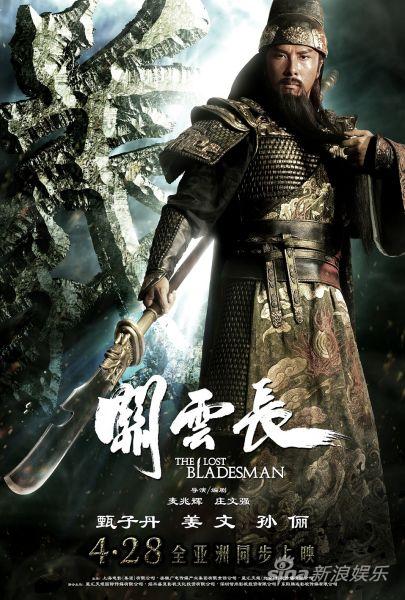Posted: Wed., May. 4, 2011, 6:18am PT
Festival
The Lost Bladesman
(Guan yun chang)
(Hong Kong-China Mandarin dialogue)
By Russell Edwards
An Icon release (in Australia) of a Shanghai Film Group, Anhui Media Industry Group, Star Union Skykee Film & Media Advertisement presentation, in association with Star Union Skykee Film & Media Advertisement, Shao Xing Sheng Xia Film & TV Cultural Investment, Dong Yang Teng Yuan Film & Media Advertisement, Shenzhen Zhi Shang Film & TV Investment of a Pop Movies production. (International sales: Easternlight, Los Angeles.) Produced by Leung Ting, Wang Tianyun. Executive producers, Leung Ting, Ren Zhonglun, Li Jinhua. Directed, written by Alan Mak, Felix Chong.
With: Donnie Yen, Jiang Wen, Sun Li, Alex Fong, Chen Hong, Shao Bing, Andy On, Wang Xuebing, Edison Wang, Zhou Bo.
Glorious martial-arts mastery is trumped by Machiavellian manipulations in period actioner "The Lost Bladesman." Action helmer/star Donnie Yen's memorable setpieces satisfy the senses, while the script by directing duo Alan Mak and Felix Chong provides an intellectual counterbalance to the film's physicality, as magnetic co-lead Jiang Wen contemplates heroism's shortcomings in the broader political game. After opening the Beijing fest, pic made $5 million in three days on the mainland, and other Chinese territories will follow suit. Lack of the overt Sino nationalism that marked "Ip Man 2" makes this an easier sell to Westerners, although ancillary will be stronger.
Central characters will be familiar to Chinese history buffs and film fans who took notes during John Woo's great 2008 epic "Red Cliff." Thus, the opening credits sequence, showing the carving of a coffin, doesn't bother to hide where the protagonist, noble swordsman Guan Yunchang (Yen), will end up, or the fact that the Iago-like Gen. Cao Cao (Jiang) will outlast him.
Told via extended flashbacks set around 200 A.D., during the late Han dynasty, the story begins in Baima, where Cao and his army are under siege by rival warlord Yuan Shao (never seen). Already Cao's prisoner, Guan is drafted to fight. His reward is freedom, which he uses to escort concubine Qilan (Sun Li), whom Guan happens to be in love with, to Cao's sworn enemy, Liu Bei (Alex Fong). The catch is that, even after proving his allegiance to Cao's youthful and easily manipulated Emperor (Edison Wang), Guan must battle several other rival warlords en route to Qilan's delivery point.
The treacherous Cao sure doesn't make it easy for Guan. Dongling Pass warlord Kong Xiu (Andy On) is given advance notice of Guan's "betrayal" of the Emperor by carrier pigeon, setting up the first battle in which Yen's action choreography really rips loose. While this combat sequence has an "El Cid"-like majesty, Guan's match against Kong, in a circular alleyway with insufficient space for combatants to twirl their long spears, is a stunning appetizer that could have easily played as a magnificent finale. Other contests ensue (including a minimalist take on the classic one man-against-a-hundred conflict, conducted here behind closed doors), allowing helmers Mak and Chong (who co-wrote "Infernal Affairs") to indulge a variety of cinematic techniques, some with a very contempo feel, to keep each fight scene visually distinct.
Fortunately, Yen's prowess is showcased more often than his thesping limitations. Supporting perfs are solid, with Zhou Bo making a strong impression in his brief appearance as a Buddhist monk.
But pic belongs to Jiang, whose portrayal of political strategist Cao appears so natural it's easy to forget he's acting. Poised and smart, with reserves of unexpressed power, Jiang endows the pic with the sophistication that thesps like Anthony Hopkins or Alan Rickman sometimes bring to Hollywood actioners. The difference here is that Jiang's fulfills the script's obvious aspiration to be more than just a martial-arts showpiece. By way of contrast, distaff thesp Sun is reduced to playing a beautiful ornament.
Lensing varies in accordance with the helmers' whims. The fight sequence in Luoyang's mill fortress brims with deep shadows lacquered with golden light. Later, another well-helmed scene with Sergio Leone-like overtones appears so washed out it looks like a last minute add-on.
Production standards are generally high, and the re-creation of the Han era is easy on the eyes. Special effects, particularly hurtling arrows and thrusting spears and knives, blend well with Yen's smoothly choreographed moves.
Robust score by Henry Lai underlines the vigorous helming, although the closing-credits theme song by Ikuro Fujiwara is just the standard pop sop to Asian youth. Theaters equipped with Dolby 7.1 will get the full benefit of the soundtrack's amplified airborne swooshes and metallic clangs in every battle.
Mandarin title is simply the name of Yen's character, reflecting the extent of the historical figure's fame.
Camera (color, widescreen), Chan Chi-ying; editor, Kwong Chi-leung; music, Henry Lai; production designer, Bill Lui; art director, Liu Jinping; costume designer, Zhang Ling; action director, Donnie Yen; sound (Dolby Digital/Dolby Surround 7.1), Kinson Tsang. Reviewed at Cinema 12, Broadway, Sydney, April 28, 2011. (In Beijing Film Festival -- opener.) Running time: 108 MIN.






 Reply With Quote
Reply With Quote








 All my life I thought Pearl Harbor was attacked by the Japanese.
All my life I thought Pearl Harbor was attacked by the Japanese.